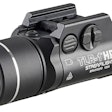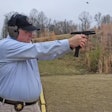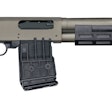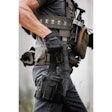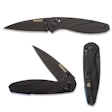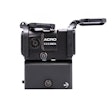 Photo: Kelly Bracken
Photo: Kelly Bracken
Lost in all the storm and fury over the proposed federal Assault Weapons Ban is the effects that these measures will have on the men and women responsible for maintaining public safety.
For proof of how dangerous it can be to rush gun control legislation into law, all you have to do is look at New York. Last month the Empire State passed a law that will ban the sale of so-called "assault weapons" and criminalize the possession of pistol and rifle magazines of more than seven rounds. But in their rush to punish law-abiding gun owners for the actions of the criminally insane, the New York legislators and the governor didn't realize that they were causing a lot of unnecessary confusion for law enforcement.
The Draconian New York "gun safety" law, which takes effect in March, does not specifically exempt LEOs. Which has made every cop, deputy, trooper, and agent in the state wonder if he or she will be in violation when the new law goes into effect. Existing law has now been interpreted to provide an exemption for LEOs that would carry over into the new law.
But questions still remain. No one is quite sure how the New York law affects retired officers who have a federal right to carry concealed handguns under the Law Enforcement Officers Safety Act of 2004. And I have it on good authority that the law has no provision to exempt private security.
At first glance, you may think something that affects private security is not a big issue. After all, who cares if a bunch of "mall cops" are restricted to seven-round mags?
Some security guards and private security officers are indeed "mall cops;" others, however, are the first line of armed response at nuclear power stations, chemical plants, oil refineries, and other critical pieces of infrastructure. Imagine that you are one of these highly trained civilian security professionals and you don't know whether possession of the magazine in your handgun constitutes a misdemeanor. This is what happens when people rush gun control legislation into law.
So what happens if the new federal gun safety act proposed by Sen. Diane Feinstein becomes law? I don't know. But I can make an educated guess. I believe it will make procurement of patrol rifles a lot more difficult for the average cop. Follow along with me for a moment.
Walking around the recent Shooting Hunting and Outdoor Trade (SHOT) Show in Las Vegas a few weeks ago, I started thinking about what a new and permanent assault weapon ban might mean for the gun industry. In a word: Devastation.
There are dozens of small to mid-size companies that do nothing but produce what the industry refers to as "modern sporting rifles" and parts for "modern sporting rifles." These are the ARs and other semi-automatic versions of rifles that gun control advocates refer to as "assault weapons." Very few of these companies can survive an assault weapon ban.
That means the number of sources for police patrol rifles will dry up. But the demand for these weapons by law enforcement officers will remain steady. I'm no economist, but I believe that is the formula for radical price increases.
Some of you who work for certain well-heeled agencies probably don't see that as a big concern. You don't worry about the price of equipment because the agency gives you what you need.
That's great for you. But most police in this country work for agencies with fewer than 10 officers, and the officers who work for such small agencies pretty much have to buy their own gear.
What that means is when a sergeant approaches the chief of Smallville PD and says that the department needs a patrol rifle, the chief will say, "Great. You want one, you pay for it. We don't have the budget for it. But I'll authorize you to carry it when you qualify with it." So the sergeant or the senior officer who sees a tactical need for a patrol rifle goes out and buys an AR out of pocket from one of the dozens of vendors that make such rifles.
If the assault weapons ban becomes law, that small agency sergeant is not going to be able to afford that rifle anymore. It will only be available from the companies that make such a gun in mass quantities for the military, and they will have a captive market. These companies may not even make semi-auto versions anymore. Which means the concept of patrol rifles on a lot of agencies may fade away because few chiefs will want their officers carrying "machine guns."
This is why the proposed federal Assault Weapons Ban, which is supposed to curtail mass shootings, could be very bad for law enforcement officers. It may take the tools you need to protect the public from active shooters right out of your hands.
Related:










